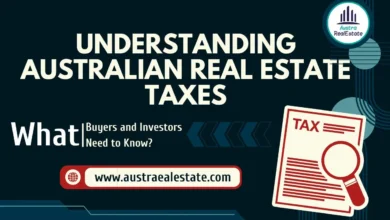Australian Property Tax Laws as an Investor:How to Navigate

How to Navigate Australian Property Tax Laws as an Investor
Investing in Australian property can be profitable, but understanding tax laws is key to maximizing returns and staying compliant. As a property investor, you’ll face several taxes, including capital gains tax (CGT), goods and services tax (GST), and land tax. Knowing how these taxes apply to your investments can help you avoid penalties and manage your finances effectively.
1. Capital Gains Tax (CGT) in Australian Property Tax Laws
The tax is based on the difference between the purchase price and the sale price, minus eligible expenses like legal fees and improvements.
- How CGT Works: The gain is added to your taxable income for that year, and you pay tax at your marginal rate. However, if you’ve held the property for more than 12 months, you may qualify for a 50% discount on the CGT.
- Tip: To minimize CGT, consider holding the property long-term or using a company or trust structure for tax advantages.
2. Goods and Services Tax (GST) in Australian Property Tax Laws
GST usually doesn’t apply to residential property sales, but it can affect commercial properties or new residential developments. Understanding GST is crucial if you’re investing in these areas.
- Residential Properties: GST doesn’t apply to most residential property sales, but it may if you’re involved in property development.
- Commercial Properties: GST often applies to commercial property deals. If registered for GST, you can claim credits for GST paid on related expenses.
- Tip: Check with a tax professional to see if GST applies to your property deals and how to claim credits if eligible.
3. Land Tax in Australian Property Tax Laws
Land tax is an annual charge based on the value of land you own. State and territory governments apply this tax, and rules vary by location.
- Who Pays Land Tax?: Investment properties are generally subject to land tax, but principal residences are usually exempt. There are exemptions for properties used for farming or other purposes.
- Thresholds and Rates: States have different thresholds and rates for land tax. For instance, New South Wales has a $969,000 threshold in 2024, while Victoria’s is $300,000.
- Tip: If you own properties in multiple states, land tax is calculated separately in each state. Diversifying across states can help lower your tax bill.
4. Negative Gearing and Deductions
Negative gearing allows investors to offset rental losses against other income, reducing their tax burden. If your rental income is less than your expenses, such as loan interest or management fees, you can use this strategy.
- Claiming Deductions: You can claim expenses like interest on loans, repairs, and property management fees. Accurate records are essential for maximizing deductions.
- Tip: Consult an accountant to ensure you’re fully using negative gearing and other tax deductions, especially if you own multiple properties.
5. Foreign Investor Considerations
Foreign investors face additional tax rules in Australia. Higher rates of CGT and land tax may apply, and foreign investors must get approval from the Foreign Investment Review Board (FIRB) before purchasing residential properties.
- CGT for Foreign Investors: Foreign residents don’t get the 50% CGT discount available to Australian residents after holding property for over 12 months.
- Land Tax Surcharges: Some states, like Victoria and New South Wales, impose extra land tax on foreign owners, adding to the cost of investment.
- Tip: Foreign investors should seek expert advice to ensure they understand and comply with Australia’s tax rules.
6. Consult a Professional
Australian property tax laws can be complex. Working with a tax advisor or accountant who specializes in property can help you stay compliant and maximize tax savings.
An accountant can assist with:
- Understanding which taxes apply to your properties.
- Claiming all eligible deductions.
- Structuring your investments for optimal tax benefits.
Conclusion
Navigating property tax laws in Australia as an investor requires a solid understanding of capital gains tax, land tax, GST, and deductions. By being informed and consulting professionals, you can protect your investments, minimize tax liability, and improve your long-term returns. Ensure you’re maximizing your property portfolio’s potential by following the right tax strategies.



